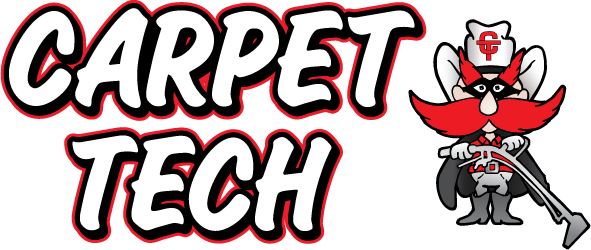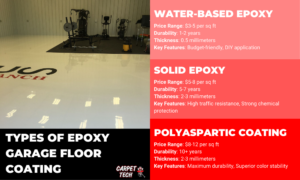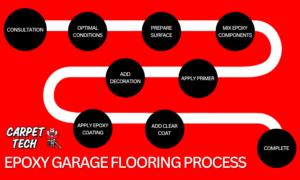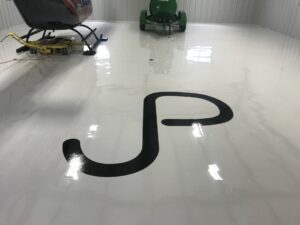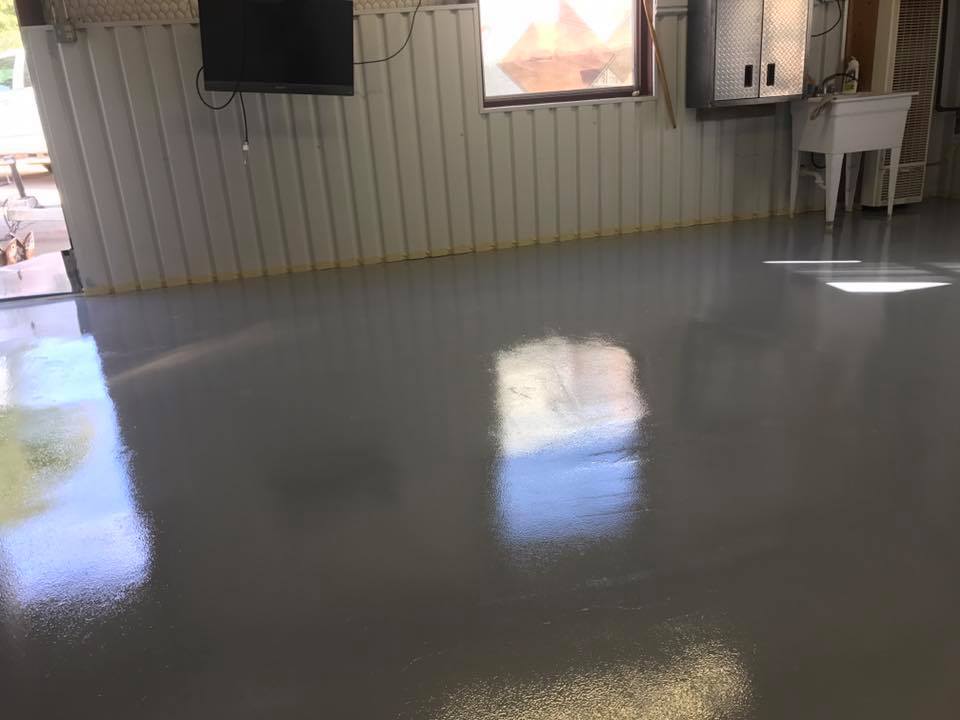
Epoxy garage flooring creates a strong protective coating that transforms a concrete garage floor into a smooth, attractive surface that lasts up to 20 years. A gleaming, professional-grade epoxy floor coating does more than just look impressive – it stands up to heavy vehicle traffic, resists chemical spills, and handles daily wear with minimal maintenance. Epoxy flooring achieves this by combining epoxy resin with a hardener, creating a rigid plastic surface that bonds directly to your garage floor.
For a standard two-car garage (400-500 sq ft), professional installation ranges from $1,200 to $6,000, with costs varying based on material quality and labor costs. While the upfront investment might seem substantial, properly installed epoxy garage floors provide excellent value through their durability and low maintenance requirements. However, the success of your garage upgrade depends heavily on surface preparation and installation methods. Poor application can result in peeling, bubbling, and other issues that compromise both appearance and function.
Quality and Material Considerations
The quality and type of materials you choose for your epoxy garage floor directly impact the overall cost of your project. Different epoxy floor coating options come with varying price points, durability levels, and maintenance needs – all of which affect your long-term investment. Understanding these differences helps you make an informed decision between upfront costs and lasting value.
Types of Epoxy Coatings and Their Cost Impact
Water-based epoxy systems represent the lower end of the price spectrum and are common for DIY projects. While they offer the most budget-friendly initial cost, their thinner finish means more frequent reapplication. Solid epoxy sits in the mid-to-high price range, delivering a thick, durable garage floor coating made from 100% epoxy resins that resist impacts and heavy traffic. Polyaspartic coating options command premium prices but combine epoxy’s strength with enhanced flexibility, providing excellent scratch resistance and color stability.
Material Quality and Price Considerations
The thickness of your epoxy flooring influences both cost and performance. Professional-grade solid epoxy measures 2-3 millimeters thick, requiring more material per square foot and raising costs compared to water-based epoxy at 0.5 millimeters. Chemical resistance varies by price point – higher-priced solid epoxy and polyaspartic coatings offer superior protection against oil, gasoline, and cleaning products, while less expensive water-based systems provide basic protection.
UV Stability and Long-term Value
UV stability affects your concrete coating’s appearance and replacement frequency. Budget-friendly water-based epoxy yellows in sunlight, often requiring replacement within 1-2 years. Mid-range solid epoxy shows improved UV resistance. Premium polyaspartic coating systems maintain their color and clarity for 5-10 years with proper maintenance.’
Your material choice significantly influences total ownership costs. Water-based systems need replacement every 2-3 years, making them potentially more expensive over time despite lower upfront costs. Solid epoxy installations last 5-7 years, offering better value for the mid-range investment. Polyaspartic coatings, while most expensive initially, can exceed 10 years of service, often proving most cost-effective long-term with proper care and maintenance.
Environmental and Site Factors
The condition of your garage floor and various environmental factors play a major role in determining epoxy flooring installation costs. Understanding these elements helps explain why quotes often vary between projects and square footage.
Garage Condition Assessment
The current state of your concrete floor stands as one of the biggest cost factors in any epoxy garage floor project. Surfaces with minimal damage might only need basic surface preparation, while those with significant issues require more extensive work before installation can begin. Minor repairs like small cracks or surface pitting typically have a modest impact on the budget. However, when dealing with deep cracks or extensive deterioration, labor costs increase substantially. Moisture problems demand specialized solutions that can significantly raise the overall price. Additionally, if old floor coating needs removal, this preparation step adds to the final cost.
Climate Considerations
Weather and timing directly impact both installation methods and epoxy coating performance. Projects completed in moderate temperatures between 55-90°F follow standard installation procedures and pricing. However, extreme temperatures require special techniques that increase costs. This might include renting climate control equipment, allowing for extended curing times, and scheduling additional labor hours. High humidity presents its own challenges, often requiring moisture mitigation systems and extended project timelines. These conditions typically necessitate additional ventilation equipment, further impacting the total cost.
Space Usage Requirements
Your garage’s intended purpose guides material selection and influences overall costs. For basic residential use, standard epoxy flooring systems often suffice. Garages expecting heavy equipment traffic need premium, thicker coatings for durability. Areas exposed to chemicals require specialized resistant formulations, while high-impact zones benefit from multi-layer systems with reinforcement. These specialized materials and application methods, while more expensive initially, provide the appropriate protection level for each specific use case and help prevent costly repairs in the future.
Installation Considerations
When deciding how to install an epoxy garage floor, homeowners face an important choice between professional installation and DIY approach. Professional installation typically takes 2-3 days and includes specialized equipment like diamond grinders, industrial vacuums, and professional-grade mixing tools. DIY projects for garage floor coating often extend to 4-5 days due to learning curves and limited equipment access.
Professional installers bring technical expertise in moisture testing, surface profiling, and proper mixing ratios for epoxy flooring. They understand how temperature and humidity affect curing times and can identify concrete floor issues that might compromise adhesion. DIY installations require significant research and careful attention to manufacturer instructions, plus renting or purchasing necessary tools like grinders, shop vacs, and application equipment.
Surface preparation makes up about 75% of a successful epoxy floor installation. This process includes:
- Concrete grinding or shot blasting to create a proper surface profile
- Crack and spall repairs using epoxy fillers
- Degreasing and thorough cleaning of oil spots
- Moisture testing using calcium chloride or relative humidity meters
- Acid etching for DIY applications where grinding isn’t feasible
The basic installation process follows these steps:
- Consultation
- Wait for optimal conditions (temperature, humidity)
- Ensure floors are free from solvents, grease, and debris
- Mix epoxy components according to manufacturer ratios
- Apply primer coat if specified
- Broadcast decorative flakes if desired
- Apply main epoxy coating
- Add clear top coat for additional protection
Common installation challenges include bubble formation from outgassing concrete, uneven coating thickness, and improper mixing ratios. Temperature control during application and curing remains particularly important – most epoxy floor coating systems require temperatures between 55-85°F for optimal results.
Quality control focuses on thickness measurements, checking for pinholes or thin spots, and monitoring cure times between coats. Professional epoxy flooring contractors use mil gauges and moisture meters throughout the process, while DIY installers should carefully document coverage rates and maintain consistent application techniques.
Trust Carpet Tech for Your Epoxy Floor Installation
Installing an epoxy garage floor represents a significant home improvement investment, with costs typically ranging from $3 to $12 per square ft, depending on the floor coating system and professional installation method. While the upfront expense may seem substantial, the long-term benefits often justify the investment through increased property value, improved durability, and reduced maintenance needs over time.
Before making your informed decision, take time to evaluate your concrete garage floor’s current condition, assess moisture levels, and determine your desired finish quality. Getting multiple quotes from epoxy flooring contractors will help you understand the full scope of work and the associated labor costs for your specific project. Professional installation often delivers superior results and longer-lasting performance compared to a DIY approach. View our concrete gallery for inspiration on your next concrete project.
Looking to transform your garage with a professional epoxy floor coating installation? Carpet Tech is your trusted local expert. Our highly-trained technicians have installed thousands of epoxy floors and deliver unmatched quality and durability. Get started with a FREE custom quote today. Let Carpet Tech’s proven expertise create the stunning, long-lasting garage floor you deserve.
